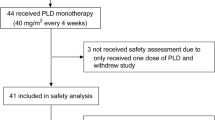Abstract.
Liposomal annamycin (L-AN) has shown antitumor activity in preclinical studies. It may selectively target tumors and bypass MDR-1 resistance. A total of 13 women with doxorubicin-resistant breast cancer were treated on this phase II study. The median number of prior chemotherapy regimens was two, and six patients had two or more organ sites of involvement. L-AN was administered at 190–250 mg/m2 as an i.v. infusion over 1–2 h every 3 weeks. No responses were observed. Of the 13 patients, 12 had clear deterioration and new tumor growth after one or two courses. The 13th patient had prolonged grade 2 thrombocytopenia after one course, and was taken off study when the lung metastases increased 62 days after treatment. L-AN at this dose and on this schedule had no detectable antitumor activity in patients with doxorubicin-resistant metastatic breast cancer.
Similar content being viewed by others
Author information
Authors and Affiliations
Additional information
Electronic Publication
Rights and permissions
About this article
Cite this article
Booser, D.J., Esteva, F.J., Rivera, E. et al. Phase II study of liposomal annamycin in the treatment of doxorubicin-resistant breast cancer. Cancer Chemother Pharmacol 50, 6–8 (2002). https://doi.org/10.1007/s00280-002-0464-0
Received:
Accepted:
Issue Date:
DOI: https://doi.org/10.1007/s00280-002-0464-0




